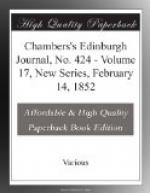Here, the cedar, palmy-branched;
Here, the hazel
low;
Here, the aspen, quivering
ever;
Here, the powdered
sloe.
Wondrous was their form and
fashion,
Passing beautiful
to see
How the branches interlaced,
How the leaves each other
chased,
Fluttering lightly
hither, thither on the wind-aroused tree.
Then he spake to those wood-dwellers:
’Ye are
like to men,
And I learn a lesson from
ye
With my spirit’s
ken.
Like to us in low beginning,
Children of the
patient earth;
Born, like us, to rise on
high,
Ever nearer to the sky,
And, like us,
by slow advances from the minute of your birth.
’And, like mortals,
ye have uses—
Uses each his
own:
Each his gift, and each his
beauty,
Not to other known.
Thou, O oak, the strong ship-builder,
For thy country’s
good,
Givest up thy noble life,
Like a patriot in the strife,
Givest up thy
heart of timber, as he poureth out his blood.
’Thou, O poplar, tall
and taper,
Reachest up on
high;
Like a preacher pointing upward—
Upward to the
sky.
Thou, O holly, with thy berries,
Gleaming redly
bright,
Comest, like a pleasant friend,
When the dying year hath end,
Comest to the
Christmas party, round the ruddy fire-light.
’Thou, O yew, with sombre
branches,
And dark-veiled
head—
Like a monk within the church-yard,
When the prayers
are said,
Standing by the newly-buried
In the depth of
thought—
Tellest, with a solemn grace,
Of the earthly dwelling-place,
Of the soul to
live for ever—of the body come to nought,
’Thou, O cedar, storm-enduring,
Bent with years,
and old,
Standest with thy broad-eaved
branches,
Shadowing o’er
the mould;
Shadowing o’er the tender
saplings,
Like a patriarch
mild,
When he lifts his hoary head,
And his hands a blessing shed,
On the little
ones around him—on the children of his child.
’And the light, smooth-barked
hazel,
And the dusky
sloe,
Are the poor men of the forest—
Are the weak and
low.
Yet unto the poor is given
Power the earth
to bless;
And the sloe’s small
fruit of down,
And the hazel’s clusters
brown,
Are the tribute
they can offer—are their mite of usefulness.
’When the awful words
were spoken,
“It is finished!”—
When the all-loving heart
was broken,
Bowed the patient
head;
When the earth grew dark as
midnight
In her solemn
awe—
Then the forest-branches all
Bent, with reverential fall—
Bent, as bent
the Jewish foreheads at the giving of the law.




